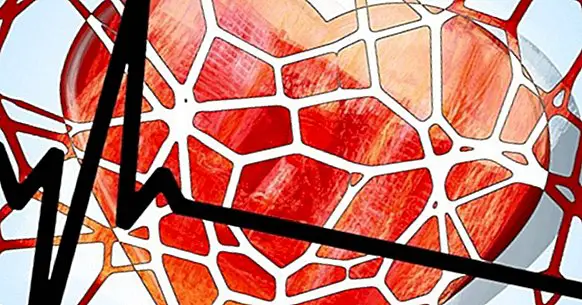Blood phobia: everything there is to know about hematophobia
The blood phobia , also known as hematophobia, is one of the phobias that generate more interest, possibly for a fairly simple reason: there are many people who do not like to see blood, and therefore can come to consider whether they experience hematophobia or not.
However, not having too many fans of blood and wounds does not mean that the blood phobia is widespread, much less. The very definition of what is meant by phobia indicates that they only occur in cases in which the levels of stress and discomfort associated with a type of stimulus damage the quality of life of the person and prevent them from performing daily activities naturally. That is why hematophobia has much more serious implications than simply trying not to hurt yourself .
After all, the blood phobia is a psychological alteration that is sometimes a reason for psychological intervention . This type of phobias can become a problem, but in most cases the symptoms can be mitigated to a point where they almost do not interfere with daily life. But to know through what mechanisms you can "cure" the blood phobia Before we have to understand what it is and in what psychological processes it is founded.
What is blood phobia?
Hematophobia is a fear of blood (and situations that are perceived as directly or indirectly related to it) that is incapacitating to lead a normal life. Thus, the phobia Blood may appear when you see this substance, but also when you see or imagine a vaccination shot or a wound in which a scab has formed, among many other situations. In short, the symptoms of blood phobia have to do with both the most basic and "crude" perceptions related to blood and with the somewhat more abstract ideas that are related to it.
But in addition to being associated with the fear of one's own blood or that of others, hematophobia is based on another aspect of panic: the fear of the very symptoms that these crises generate . That is why the blood phobia is based in part on the phenomenon of fear of fear, characteristic that shares with phenomena such as agoraphobia.
Therefore, the fear that is behind the blood phobia has nothing to do with the physical pain itself, but with the idea of flowing blood and spilling. Is about a terror more irrational than practical , since what is avoided is not the situations that endanger our lives or someone else's, but rather the signs of these potentially dangerous situations.

The symptoms of hematofobia
What makes the blood phobia unique is that the crises that produce end up leading to fainting quite often , something that does not happen in other types of phobias. Although fainting is related to panic attacks, the truth is that this is not a typical symptom of most phobias, which manifest themselves from a sudden rise in tension, the appearance of extraordinarily high levels of stress and feeling of need to leave the place and get away the stimulus that has triggered the episode.
Blood phobia, however, the phobic episode has two phases, instead of just one . After a heartbeat and alertness, there is a sudden drop in blood pressure that occasionally causes fainting, causing not enough oxygen to reach the brain. In this way, the second phase of hematofobia cancels the effects of the first and even causes the blood pressure to plummet.
Thus, the symptoms of blood phobia reflect the diphasic functioning of this phenomenon. Dizziness and fainting, panic attacks, nausea and the sensation of deep disgust.
What are the causes of blood phobia?
The reasons why the blood phobia appears are not known exactly , although it has been possible to verify the fact of descending or not of a family in which someone experiences hematophobia is a very powerful factor when it comes to estimating the possibilities of having phobic episodes of this type; Blood phobia is explained in part by genetics.
It is also considered that hematophobia can develop as a result of past experiences, that is, from learning and memories. It is not strange to consider that the hematofobia can arise as a result of the experiences, taking into account that this substance usually appears in painful or unpleasant occasions. Thus, from a behavioral perspective, blood phobia can be caused by associating this stimulus with pain that generates an accident, health treatments, etc.
Can blood phobia be useful?
As well it has been proposed that the blood phobia could be based on a survival mechanism that in certain occasions it can be useful. After all, the sudden drop in blood pressure means that if this substance springs from your own wounds, you lose less. However, this hypothesis based on the adaptive potential of the voltage drop does not stop being a speculation that is difficult to verify.
In any case, it must be made clear that the main defining characteristic of blood phobia is that it is not useful at all, but quite the opposite. Although evolution may have favored the spread of certain genes related to hematophobia, the living conditions of the modern human being are very different from those of hundreds of thousands of years ago. Nowadays blood tests and vaccines are very important, and the fact that every day we interact with many people and expose ourselves to all kinds of activities (among which are to see real or fictional images in which blood appears) It turns blood phobia into a problem that, depending on its intensity, can be very disabling.
Fighting the blood phobia
Can you "cure" the blood phobia? There are multiple treatments and strategies to deal with hematofobia, but none is based on reading texts; to put a stop to blood phobia requires a live approach to the subject and the performance of certain exercises under the supervision and personalized treatment of an expert.
Among the most useful tools to make disappear hematophobia are those that are often used in the course of cognitive-behavioral therapies, which are based on the behavioral approach and emphasize desensitization so we get used to blood .
One of the most used techniques in this and many other phobias is the gradual exposure to the phobic stimulus , in this case the blood. Throughout several sessions, a person with a diagnosed phobia will gradually expose himself to situations that cause him anxiety, going from the mildest to those that involve a more direct and close contact with the blood.
Another useful tool is the learning of instructions that must be followed mentally sequentially and that have to do with the implementation of relaxation techniques and the routines of approaching what produces fear.
It is worth looking for a solution
Experiencing dizziness when blood samples are taken is relatively common, but it does not have to be synonymous with hematophobia. The blood phobia can be more or less serious and can present itself in a more or less severe and annoying way, but always involves problems related to day to day and not so much with specific experiences .
Experiencing blood phobia means going through problems related to the avoidance of medical treatments and vaccines, denying help to injured people, avoiding tasks in which there is a minimal possibility of causing injuries (cooking, hiking, etc.). ) or, in the case of women, not being able to consider the possibility of giving birth. That's why it's worth going to certified specialists and receiving your personalized attention and a diagnosis that allows you to plan treatments.



















